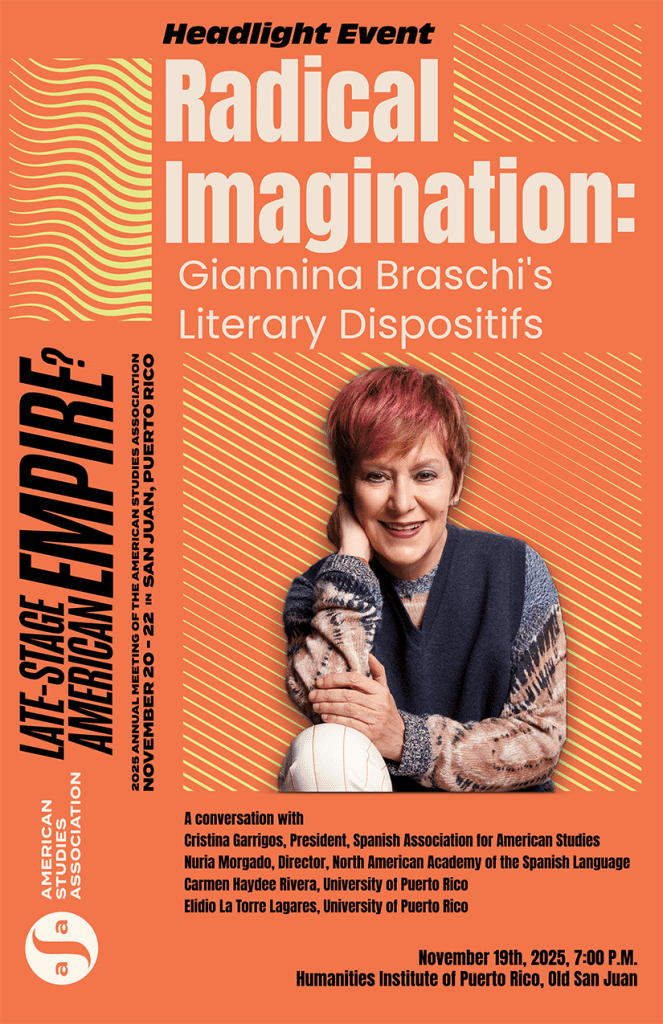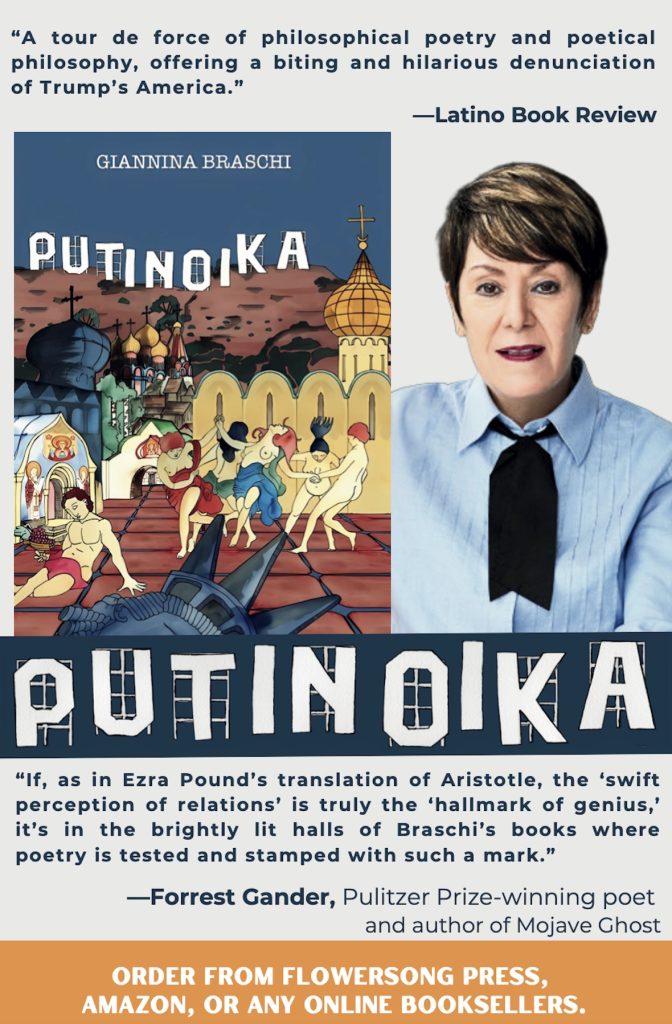Late-Stage American Empire Conference
American Studies Association Annual Meeting 2025
November 19, 2025
Headline Event: Giannina Braschi
“Radical Imagination and the Transcolonial Condition: Giannina Braschi‘s Literary Dispositifs” featuring Giannina Braschi, Elidio La Torre Lagares, Carmen Haydee Rivera, Nuria Morgado, and others.

Since the end of the Cold War, we have heard a constant refrain about the end of the American Century, the end of history, and more recently, the end of the U.S. empire. At the same time, the institutions in which we work are changing, as many eliminate the tenure-track, downsize liberal arts programs, target our knowledge production, attack our dissent, and outsource shared governance to paid consultants. “America,” as an object, has been thoroughly stripped of its exceptionalism and is bankrolling a genocide, while the forces of fascism and authoritarianism have risen across the political spectrum. Moreover, climate change may have passed a tipping point, accelerating environmental catastrophe. What kind of America is invoked in American Studies and where/how is America studied? Are we living through an historical conjuncture characterized by late-stage American empire?
We invite discussion at our 2025 conference of what American Studies is, and can be, in this moment of ongoing catastrophe and accelerating devolution. Are we experiencing the late-stage of empire and how might this era inform American Studies, broadly conceived? What sorts of violent eruptions characterize this stage of imperial transformation and through what methods, questions, theories (and from where) can we locate resources for meaning, imagine new forms of sociality, and articulate new modes of knowledge production? What possible futures do our methods enable or foreclose at the present conjuncture? How might Black Studies, Indigenous Studies, Ethnic Studies, Critical Disability Studies, Queer and Trans Studies, and Puerto Rican Studies offer critical resources for understanding the present conjuncture?
We will engage these questions and others in a context of imperial violence, colonial relations, climate catastrophe, as well as anti-racist, anti-colonial, and Indigenous resistance. Puerto Rico, our conference host, encounters daily the consequences and limits of the American empire, as well as the violent displacements caused by climate/military/cultural imperialism. Puerto Rico is also a place of insurgent knowledge formation and creative worldmaking where Indigenous, Black, and Latinx anticolonial analysis, culture, and praxis offer resources for imagining post- or counter-American American Studies. Puerto Rico forces us to confront the intimacies of empire and settler colonialism, and requires us to think with questions of decolonization, from Puerto Rico to Palestine, to Hawai‘i, to Haiti, to Congo, to Sudan.

We are thrilled to announce the addition of a Public Humanities Day on Wednesday, November 19th, in Old San Juan.
The day’s programming will include film screenings, performances, and author readings by conference participants, evening keynotes, and other featured events. Arts and culture organizations in Old San Juan will welcome ASA members via self-guided walking tours and open houses, offering opportunities to see and support a range of community-based projects.
The day will also feature a community of practice for anti-racist and anti-colonial digital archiving and public humanities projects, and provide an opportunity to assist with an anti-colonial public history initiative. This on-going collaborative project — centered on a historic cemetery across from Humanidades Puerto Rico, where a number of notable Puerto Rican political figures are buried — will kick off at the Public Humanities day and be guided entirely by local organizations, with ASA members contributing as invited research and service partners.
Events will be held at Humanidades Puerto Rico’s headquarters in the Cuartel de Ballajá of Old San Juan. This building was originally constructed by the Spanish army and has since been repurposed to promote and sustain arts and culture, hosting special arts and culture events year-round. In addition to Humanidades Puerto Rico, the building houses El Museo de las Américas (the Museum of the Americas), Academia Puertorriqueña de la Lengua Española (the Puerto Rico Academy of the Spanish Language), La Oficina Estatal de Conservación Histórica (the State Office of Historic Conservation), and other organizations. Like the state Humanities Councils on the mainland, Humanidades Puerto Rico is facing steep federal cuts to their programing, and they are excited to collaborate with ASA, convene humanities work across Puerto Rico, and illustrate the importance of their work to a broad audience.

We look forward to your participation in what promises to be a rich and meaningful day of public engagement and exchange! Due to space constraints at Humanidades Puerto Rico, a special registration process is required in addition to standard conference registration. Stay tuned!
Late Stage Empire Program
Headline Session Giannina Braschi
- Radical Imagination and the Transcolonial Condition: Giannina Braschi‘s Literary Dispositifs
- Puerto Rico on the Map: A Black Boricua Perspective on Hurricane Maria, Mutual Aid, Self-Determination and Resistance
FILM & DISCUSSION SESSIONS
- You Can’t Erase Us: Testimony as Resistance in the Time of Climate Denial
- Archives of Empire in New York & Puerto Rico
- BlackItalian: A Film Screening and Discussion
- Reclaiming Humanity: Saving Seattle’s First Filipinx American US History Course
PERFORMATIVE SESSIONS
- Drag Against Empire: A Lecture meets Lip Sync Resurrection by la Profesora Lolita Cabrón & Fam
- Trans Ecologies and the Archive: Planting Euphoria in the Late-Stage Empire
Late-Stage Empire Conference Organizers
Alex Lubin, President-elect, American Studies Association
Pennsylvania State University
Late-Stage American Empire Planning Committee Co-Chairs
Moustafa Bayoumi, Brooklyn College
Marisol LeBrón, UC Santa Cruz
Jasbir Puar, University of British Columbia
Late-Stage American Empire Planning Committee
Sara Awartani, University of Michigan
Amira Rose Davis, University of Texas
Gina Dent, UC Santa Cruz
Ira Dworkin, Texas A & M University
Cynthia Franklin, University of Hawai‘i
Emily Hobson, University of Nevada
Uahikea Maile, University of Chicago
Jorell Meléndez-Badillo, University of Wisconsin
Omar Zahzah, SF State University
